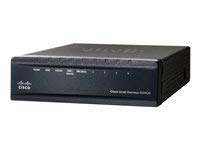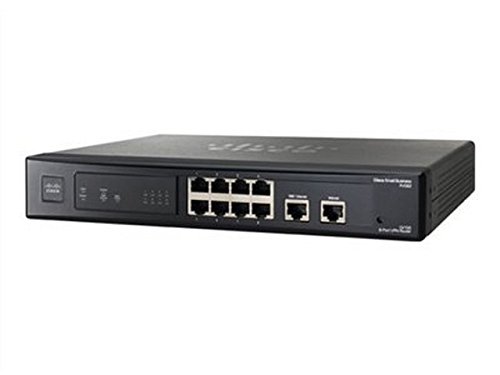The Best Cisco Router For Small Business of 2026 | SHR
Mike Kim Feb 18, 2026 3:35 PM
In the dynamic landscape of small business operations, having a robust networking infrastructure is paramount for success. Enter Cisco routers – renowned for their reliability, security, and scalability. But with a myriad of options available, selecting the ideal Cisco router for your small business can be a daunting task. Fear not, as we embark on a journey to unveil the best Cisco router tailored specifically for small business needs. From enhanced performance to seamless integration, join us as we navigate the realm of networking to find the perfect solution to propel your small business forward.
Top Rated
Source: Amazon
Best VPN Flexibility: Cisco RV340 VPN Router | 4 Gigabit Ethernet (GbE)
Pros
-
Robust Security
-
Dual WAN Support
-
Gigabit Ethernet Ports
-
Lifetime Warranty
Cons
-
Limited Device Compatibility
The Cisco RV340 stands out for its comprehensive VPN support and dual WAN capabilities, making it a reliable choice for small businesses and home offices requiring secure, flexible internet connectivity. Its integrated 4-port Gigabit Ethernet switch allows wired device connections, while advanced VPN protocols and Cisco AnyConnect support ensure secure remote access. The product comes with a limited-lifetime warranty and technical support, providing added peace of mind.
Users often praise the router’s strong security features and dependable performance, particularly valuing its dual WAN failover for uninterrupted connectivity. Some note that the device’s compatibility is somewhat limited to specific peripherals, which may require consideration depending on the user’s setup. Overall, it is favored for small-scale deployments demanding both security and network reliability.
Best Port Capacity: Cisco RV345 Dual WAN Security Router (Renewed)
Pros
-
High Port Count
-
Reliable Brand Reputation
-
Complete Essential Accessories
-
Robust Build Quality
Cons
-
Rack Mount Kit Sold Separately
The Cisco Networks RV345 offers an impressive 16-port capacity, catering well to environments that require extensive wired network connections. It comes with all essential components, including power supply and network cable, ready for quick deployment. While the rack mounting kit is not included, the device’s solid construction and Cisco’s trusted reliability make it ideal for growing small to medium-sized networks.
Users appreciate the ample ports and stable performance, noting the convenience of having all basic accessories included. The only common drawback mentioned is the additional cost and effort needed to purchase the rack mounting kit separately, which may be a consideration for those planning rack installations. Overall, the RV345 is valued for scalable and dependable networking.
Best Wi-Fi 6 Performance: Cisco C1111-8P 1100 Series 8-Port Dual WAN Ethernet Integrated
Pros
-
Wi-Fi 6 Support
-
Compact Design
-
USB Connectivity
-
Enterprise-Grade Security
Cons
-
Single-Band Only
The Cisco C1111-8P router offers solid Wi-Fi 6 performance tailored for small business and enterprise environments. Its compact, USB-connected design makes it easy to deploy without extensive hardware requirements. While it operates on a single frequency band, it still supports the latest wireless standard, delivering faster speeds and improved efficiency. The inclusion of enterprise-grade security features ensures robust protection for connected devices.
Users highlight the device’s reliability and ease of setup, especially appreciating the modern Wi-Fi 6 technology in a small form factor. However, some note the limitation of single-band operation, which may impact performance in congested wireless environments. Overall, the C1111-8P is considered a dependable option for businesses seeking streamlined connectivity with advanced features.
Best Value: Cisco Small Business Rv042g - Router - Desktop
Pros
-
Dual-Band Support
-
Integrated 4-Port Switch
-
Cost-Effective
-
Reliable Performance
Cons
-
Internal Antennas Only
The CISCO DESIGNED RV042G delivers strong dual-band connectivity combined with an integrated 4-port Ethernet switch, making it a practical choice for business environments that require reliable wired and wireless networking. Positioned as a cost-effective solution, it offers good performance without sacrificing quality. Its internal antennas support streamlined design but may limit range compared to external options.
Users appreciate the balance between affordability and functionality, frequently noting its dependable operation in small office settings. Some mention that the internal antenna design could affect wireless reach, but overall, the router is well-regarded for offering excellent value and satisfaction for budget-conscious businesses.
Best Small Business VPN: Cisco Small Business Rv082 - Router - Desktop
Pros
-
Dual VPN Support
-
8-Port Switch
-
Upgraded Hardware
-
Enhanced Security Features
Cons
-
Single-Band Wireless
The CISCO DESIGNED RV082 is tailored for small businesses requiring a reliable VPN router with integrated firewall capabilities. This updated version features improved hardware and Cisco’s upgraded operating system, enhancing security and performance over its Linksys predecessor. With an 8-port Ethernet switch, it supports multiple wired connections, making it suitable for small office networks. While it operates on a single wireless band, its primary strength lies in secure VPN functionality and stable wired connectivity.
Users often commend the RV082 for its robust VPN support and ease of configuration. The device is praised for reliable security in business environments, though some users note the lack of dual-band wireless as a limitation. Overall, it remains a favored choice for businesses prioritizing secure, wired networking with VPN flexibility.
- 9.4
- BrandCISCO DESIGNED
- 9.2
- BrandCISCO DESIGNED
- 9.0
- BrandCISCO DESIGNED
- 8.9
- BrandCisco
- 8.7
- BrandCisco
- 8.6
- BrandCisco
- 8.3
- BrandCisco
Last update on 2026-02-18 / Affiliate links / Images, Product Titles, and Product Highlights from Amazon Product Advertising API
Choosing the right router for a business requires careful consideration of several factors to ensure reliable connectivity, security, and performance. Here's a step-by-step guide to help you choose the best router for your business:
Assess Your Business Needs: Start by assessing your business's networking requirements, including the number of users, devices, and the types of activities conducted on the network. Determine whether your business requires basic internet access, advanced features like VPN support or Quality of Service (QoS) prioritization, or scalability for future growth.
Consider Internet Speed and Bandwidth: Evaluate your business's internet speed requirements and the bandwidth needed to support your operations. Choose a router with sufficient throughput to handle your current internet connection speed and accommodate potential increases in bandwidth demand as your business grows.
Security Features: Prioritize security when choosing a router for your business. Look for routers with robust security features such as firewall protection, intrusion detection and prevention, VPN support, content filtering, and guest network isolation to safeguard your network against cyber threats and unauthorized access.
Reliability and Uptime: Choose a router known for its reliability and uptime to minimize network downtime and disruptions to your business operations. Consider routers from reputable manufacturers with a track record of producing high-quality, dependable networking equipment.
Scalability and Flexibility: Select a router that offers scalability and flexibility to accommodate your business's evolving needs. Look for routers that support features like dual-band or tri-band operation, multiple Ethernet ports, and expandable memory or storage options to facilitate future upgrades and expansions.
Management and Monitoring: Choose a router with intuitive management and monitoring capabilities to simplify network administration and troubleshooting tasks. Look for routers with user-friendly web interfaces, remote management capabilities, and support for network management protocols like SNMP (Simple Network Management Protocol) for centralized monitoring and control.
Compatibility and Integration: Ensure that the router you choose is compatible with your existing network infrastructure, including modem, switches, access points, and other networking devices. Consider routers that support industry-standard protocols and technologies to facilitate seamless integration with your business's network environment.
Budget Considerations: Establish a budget for your router purchase and balance your business's networking needs with the available budget. While it's important to invest in a router that meets your business requirements, consider the total cost of ownership, including maintenance, support, and potential future upgrades, when making your decision.
By carefully considering these factors and conducting thorough research, you can choose a router that meets your business's networking needs, enhances productivity, and supports your growth objectives. If you're uncertain about which router is best suited for your business, consider consulting with a networking professional or IT specialist for personalized recommendations and guidance.
Can I use a home router for business?
Using a home router for business purposes is technically possible, but it may not always be the most suitable or reliable solution, depending on the specific needs and requirements of your business. Here are some considerations to keep in mind when deciding whether to use a home router for business:
Performance and Scalability: Home routers are typically designed for residential use and may not offer the performance, reliability, or scalability required for business environments. Business routers often have more powerful hardware, advanced features, and better support for multiple users and devices, making them better suited for handling the demands of a business network.
Security: Business networks require robust security measures to protect sensitive data, customer information, and proprietary business assets. While some home routers offer basic security features such as firewall protection and WPA2 encryption, they may not provide the same level of security as business-grade routers, which often include advanced security functionalities like intrusion detection and prevention, VPN support, content filtering, and more frequent firmware updates to address security vulnerabilities.
Management and Monitoring: Business routers typically offer more extensive management and monitoring capabilities than home routers, allowing network administrators to efficiently oversee and troubleshoot the network. Business routers may support features such as centralized management interfaces, remote administration, SNMP monitoring, and detailed logging and reporting, which are essential for maintaining network performance and uptime in a business environment.
Support and Warranty: Business-grade routers often come with better technical support options and longer warranty periods compared to consumer-grade routers. This can be critical for businesses that rely heavily on their network infrastructure and cannot afford prolonged downtime or disruptions to their operations.
Compliance and Regulations: Depending on your industry and location, your business may be subject to specific regulatory requirements or compliance standards related to data security, privacy, and network infrastructure. Using a home router that does not meet these regulatory requirements could potentially expose your business to legal and financial risks.
Total Cost of Ownership: While home routers may be initially cheaper than business-grade routers, it's essential to consider the total cost of ownership over the router's lifespan. Business routers often offer better long-term value due to their higher performance, reliability, security, and support options, which can help minimize maintenance costs, downtime, and potential security breaches.
In conclusion, while using a home router for business purposes may be feasible for some small or home-based businesses with modest networking needs and budget constraints, it's generally advisable to invest in a business-grade router that is specifically designed to meet the demands of a professional environment. A business-grade router can provide better performance, security, management capabilities, and support options, ultimately contributing to the efficiency, reliability, and security of your business network.
How many routers do I need for a small business?
The number of routers needed for a small business depends on several factors, including the size of the business premises, the layout of the space, the number of users and devices, and the specific networking requirements. Here are some general guidelines to help determine how many routers may be needed for a small business:
Single Router Setup: In many cases, a small business with a relatively small office space and a limited number of users and devices may only require a single router to provide Wi-Fi coverage and connectivity throughout the premises. A single router can typically cover areas of up to a few thousand square feet, depending on factors such as building materials and obstructions.
Multiple Access Points: For larger office spaces or areas with poor Wi-Fi coverage due to structural obstacles or interference, deploying multiple access points (APs) or a mesh Wi-Fi system may be necessary to ensure reliable connectivity throughout the premises. Access points can be connected to a single router or distributed strategically to provide seamless roaming and improved coverage.
Segregation of Networks: Some small businesses may require separate networks for different purposes, such as guest Wi-Fi access, employee Wi-Fi, and secure network segments for sensitive data or business operations. In such cases, additional routers or access points may be needed to create and manage multiple networks effectively.
Redundancy and Failover: Small businesses that rely heavily on internet connectivity for their operations may benefit from redundant or failover router setups to ensure continuity in case of router failure or internet service disruptions. This may involve deploying multiple routers with automatic failover capabilities or setting up redundant internet connections from different ISPs.
Remote Locations or Branch Offices: If a small business has multiple locations or branch offices, each location may require its own router or access point setup to provide localized Wi-Fi coverage and network connectivity. However, centralized management and monitoring tools can help streamline network administration across multiple locations.
Ultimately, the number of routers needed for a small business will vary based on factors such as the size and layout of the premises, the number of users and devices, the desired level of coverage and redundancy, and any specific networking requirements or constraints. It's essential to assess your business's needs carefully and consult with a networking professional or IT specialist to determine the optimal router setup for your small business.
Read More:
10 Best Wireless Router For Comcast We've Tested: Top Rated
The Best Wifi Router: Reviews and Rankings for you
In conclusion, selecting the best Cisco router for small business hinges on balancing performance, security, and scalability to meet specific operational needs. Cisco’s range offers robust options designed to support reliable connectivity and protect sensitive data while accommodating future growth. By choosing a model tailored to the size and demands of your business, you ensure efficient network management and enhanced productivity. Investing in a Cisco router built for small business environments ultimately delivers a solid foundation for seamless communication and long-term success.




























